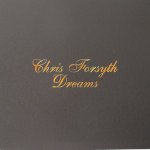While this album bears the name of Chris Forsyth, he is joined on Dreams by Peeesseye brethren Jaime Fennelly and Fritz Welch on a few tracks, as well as experimental trumpeter Nate Wooley, Shawn Edward Hansen, and Phantom Limb. On first listen, the tracks seem aesthetically and expressively disparate. But after multiple listens, and once the album title is taken seriously, the disruptions become smooth, grounded on a soothing dream-aspect. The listener is meant to linger between dream phases, absorbed by blankets of sound-texture, transitioning softly between the overlapping embraces of soundworlds.
“Soft History” opens Dreams with mesmerizing, repetitive acoustic picking phrases. While the guitar sound Forsyth captures here slightly resembles that of pickers like James Blackshaw, his style is more playful and curious than it is brooding and mystical. Wooley’s trumpet sustains and breezes above the trance gracefully, later accompanied by a droning organ. Just before the three-minute mark, electronic noise and fuzz sneak into the mix, similar to Fred Lonberg-Holm’s contribution to projects like Vox Arcana. However, this entrance doesn’t disrupt and challenge the established vibe as much as it enhances the contemplative mood. It is here that Forsyth presents some of his most compelling ideas, namely contrasting seemingly conflicting sounds to reveal their compatible modalities. One might say that he is softening these sounds’ historical values.
It’s no mystery that the guitar has been an instrument of derision within both indie and experimental circles, and this backlash against the instrument’s proliferation through rock history and popular culture continues. Given this historical and cultural context, it is hard to think of “String Haters” as being anything other than a fierce blow directed to those who perpetuate or even applaud this derision. Aside from this song being something of a guitar manifesto, it is the strongest piece on the album, if not Forsyth’s best work thus far. Swirling patterns and textures of looped guitar steadily build, leading to a violent sonic attack of multiple lead phrases. The shifting waves of distortion create an architectural framework, constructing intense layers of warm fuzz tone.
“Long Warm Afternoon” is the most uneventful and, perhaps, given its title, intentionally fleeting moment on the album, grounded on a fairly pop-friendly guitar phrase. The song vanishes from memory as soon as it makes its appearance, leaving little behind to warrant future returns. “Dream Number One,” however, which opens with an extended organ drone and the random words of Fritz Welch, makes up for this slight setback. Violent clangs of metallic scraping and screeching burst into the drone, along with aleatoric droplets of mysterious percussion: the sound of someone feverishly searching through a toolbox for a utensil that is no longer ready at hand, or for a dream memory that is slipping evasively through the unconscious. The drone sustains and eventually welcomes Forsyth’s dancing shimmers and bends. The structural clean notes are met with celebratory guitar howls that drift above the hum, birdlike and free, showing Forsyth’s ability to produce an interactive and material dream-space for antagonistic sound forms.
1. Soft History
2. String Haters
3. Long Warm Afternoon
4. Dream Number One
More about: Chris Forsyth




